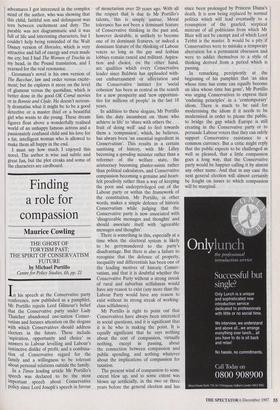Finding a role for compassion
Maurice Cowling
THE GHOST OF TORYISM PAST; THE SPIRIT OF CONSERVATISM FUTURE by Michael Portillo Centre for Policy Studies, f6, pp. 21 In his speech at the Conservative party conference, now published as a pamphlet, Mr Portillo rejects Lord Gilmour's belief that the Conservative party under Lady Thatcher abandoned one-nation Conser- vatism and focuses attention on the slogans with which Conservatives should address electors in the future. These include `aspiration, opportunity and choice' as answers to Labour levelling and Labour's instinctive dislike of profit, and a combina- tion of Conservative regard for the family and a willingness to be tolerant about personal relations outside the family.
In a Times leading article Mr Portillo's speech was declared to be the most important speech about Conservative policy since Lord Joseph's speech in favour of monetarism over 20 years ago. With all the respect that is due to Mr Portillo's talents, this is simply untrue. Moral tolerance has not been a dominant feature of Conservative thinking in the past and, however desirable, is unlikely to become one of its dominant features, or indeed a dominant feature of the thinking of Labour voters so long as the gay and lesbian lobbies remain rancid and militant. Aspira- tion and choice, on the other hand, are qualities which every Conservative leader since Baldwin has applauded with- out embarrassment or affectation and the Conservative instinct for 'social cohesion' has been as central as the search for a new prosperity and 'new opportuni- ties for millions of people' in the last 18 years.
In addition to these slogans, Mr Portillo lists the duty incumbent on 'those who achieve in life' to 'share with others the . . . fruit of doing well' and to feel towards them a 'compassion', which, he believes, has always been 'an essential ingredient in Conservatism'. This results in a certain sanitising of history, with Mr Lilley becoming a spending minister rather than a reformer of the welfare state, the aristocracy becoming plaster-saints rather than political calculators, and Conservative compassion becoming a genuine and heart- felt proclivity rather than a way of keeping the poor and underprivileged out of the Labour party or within the framework of the constitution. Mr Portillo, in other words, makes a simple defence of historic Conservatism while judging that the Conservative party is now associated with `disagreeable messages and thoughts' and should associate itself with 'agreeable messages and thoughts'.
There is something in this, especially at a time when the electoral system is likely to be gerrymandered to the party's disadvantage. But there is also a failure to recognise that the defence of property, inequality and differentials has been one of the leading motives of historic Conser- vatism, and that it is doubtful whether the Conservative Party without a strong streak of rural and suburban selfishness would have any reason to exist (any more than the Labour Party would have any reason to exist without its strong streak of working- class selfishness).
Mr Portillo is right to point out that Conservatives have always been interested in social questions, and it is significant that it is he who is making the point. It is equally significant that he says nothing about the cost of compassion, virtually nothing, except in passing, about the connection between compassion and public spending, and nothing whatever about the implications of compassion for taxation.
The present wind of compassion to some extent blew up, and to some extent was blown up artificially, in the two or three years before the general election and has since been prolonged by Princess Diana's death. It is now being replaced by normal politics which will lead eventually to a resumption of the gnarled, sceptical mistrust of all politicians from which Mr Blair will not be exempt and of which Lord Tebbit is the master. It would be a pity if Conservatives were to mistake a temporary aberration for a permanent obsession and were to addict themselves to a style of thinking derived from a period which is passing.
In remarking percipiently at the beginning of his pamphlet that 'an idea whose time has come can equally become an idea whose time has gone', Mr Portillo was urging Conservatives to express their `enduring principles' in a 'contemporary' idiom. There is much to be said for modernising the idiom if it needs to be modernised in order to please the public, to bridge the gap which Europe is still creating in the Conservative party or to persuade Labour voters that they can safely support Conservative resistance to a common currency. But a critic might reply that the public expects to be challenged as well as pleased, that a little compassion goes a long way, that the Conservative party would be happier calling it by almost any other name. And that in any case the next general election will almost certainly be fought on issues to which compassion will be marginal.


















































































 Previous page
Previous page